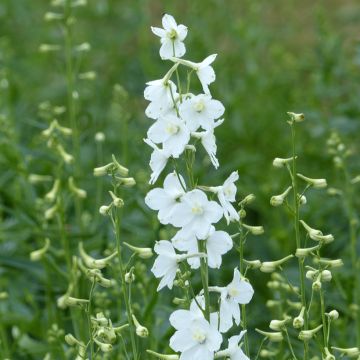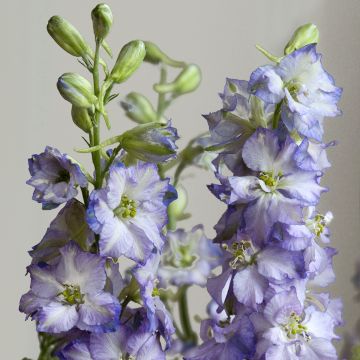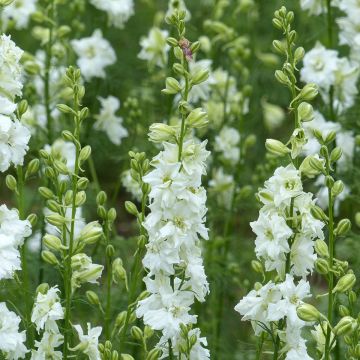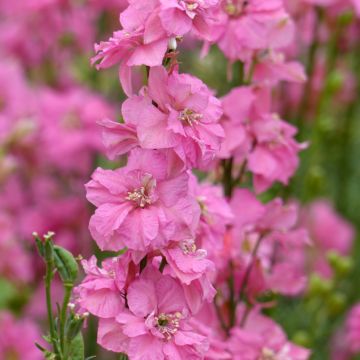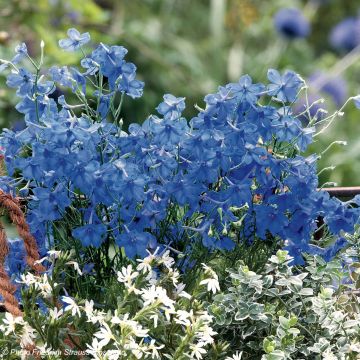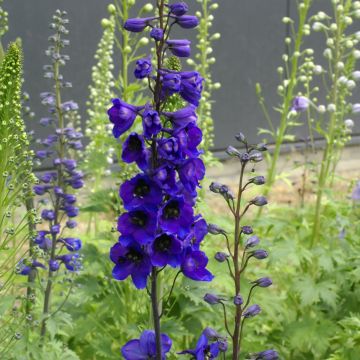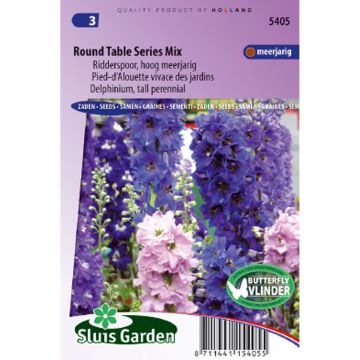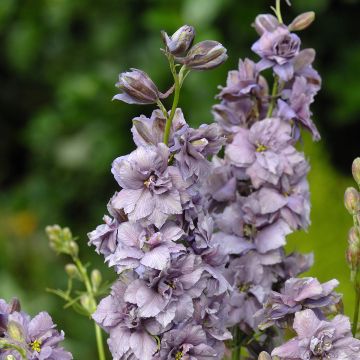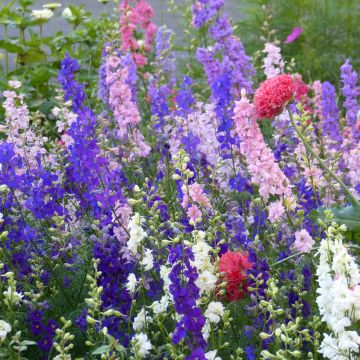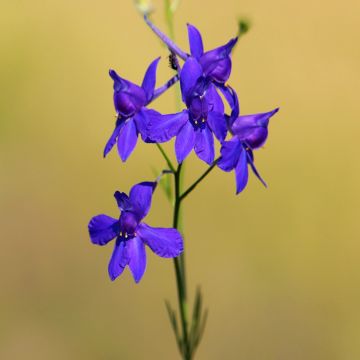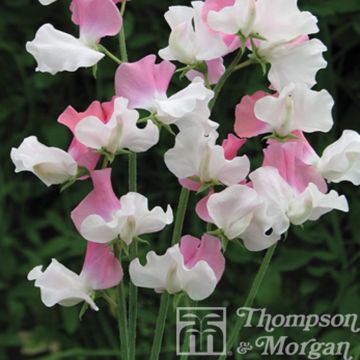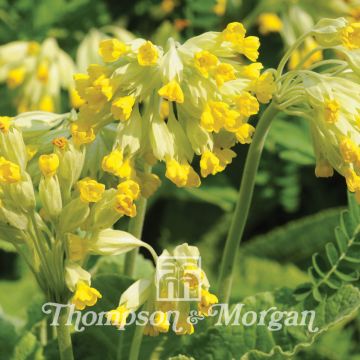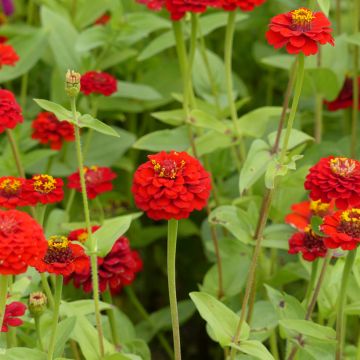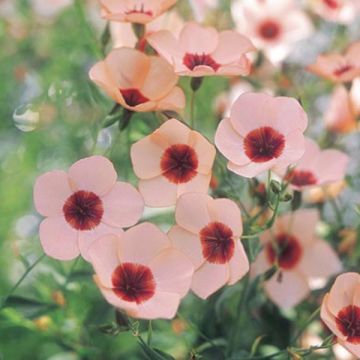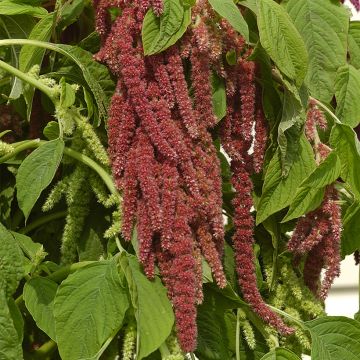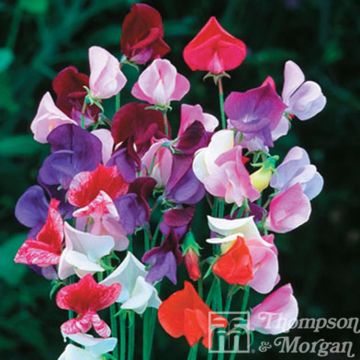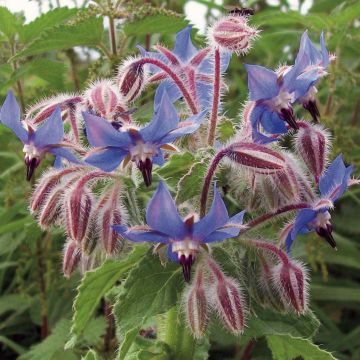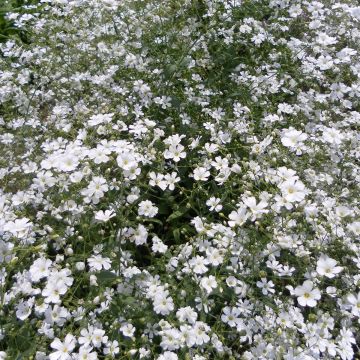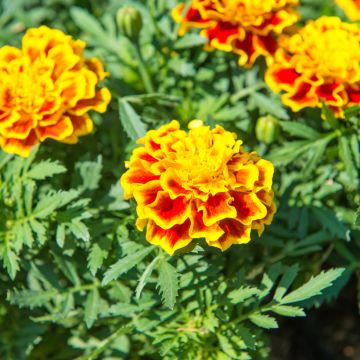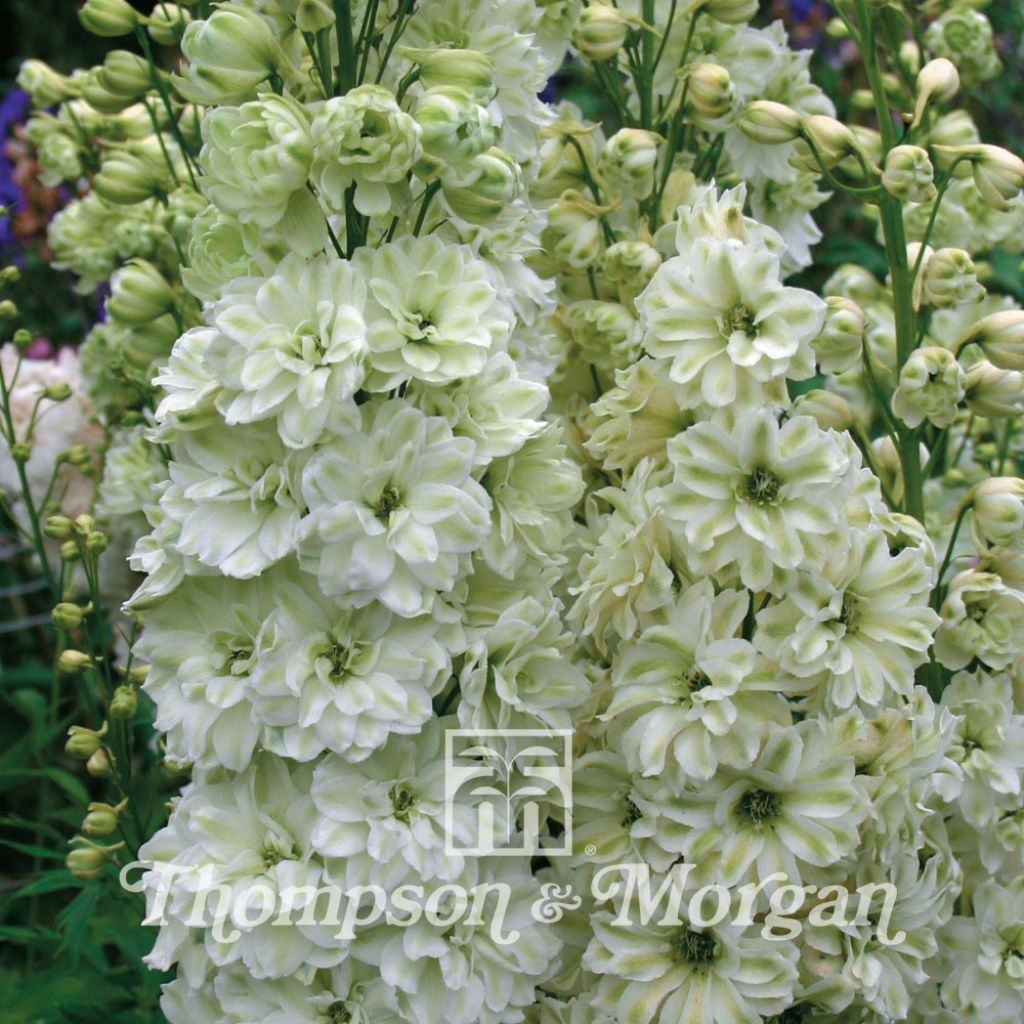

Graines de Delphinium Green Twist - Pied d'Alouette hybride blanc et vert pâle
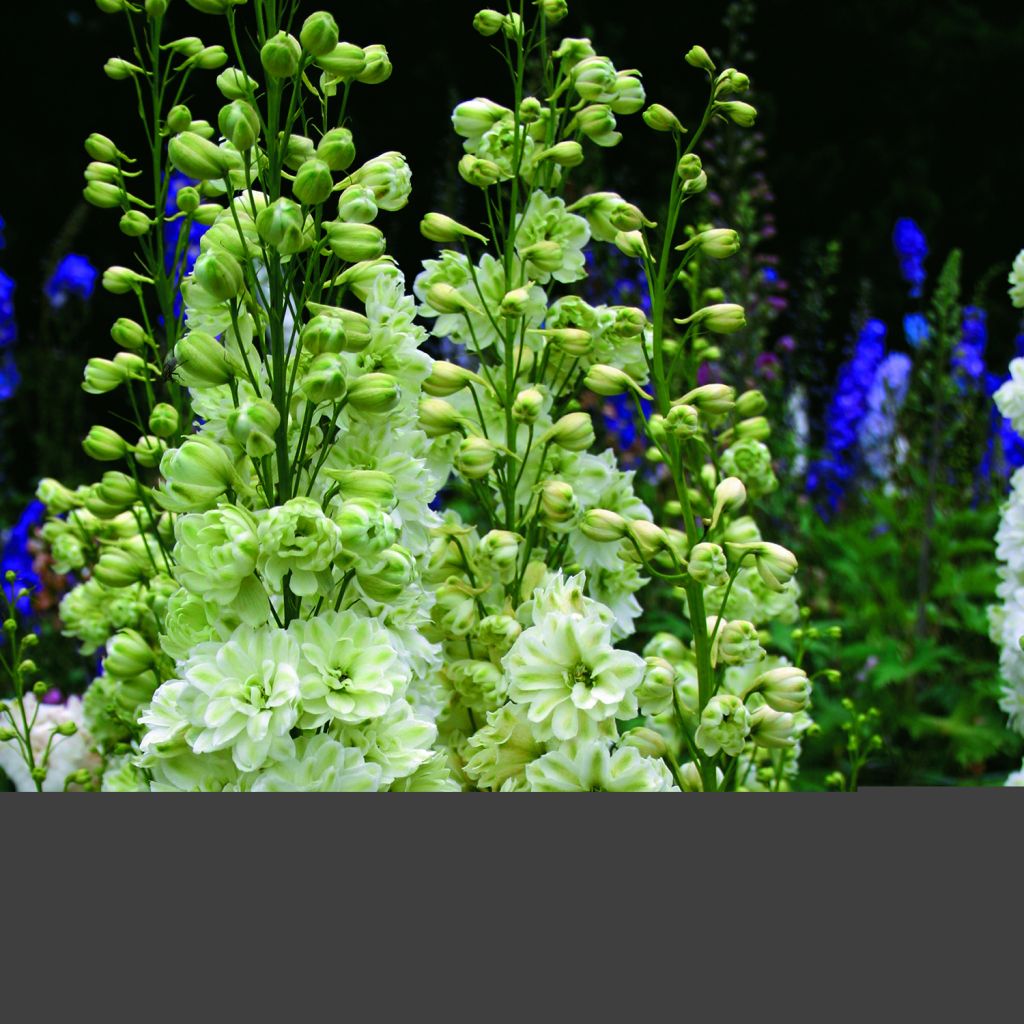

Graines de Delphinium Green Twist - Pied d'Alouette hybride blanc et vert pâle
Delphinium Green Twist - Perennial Larkspur seeds
Delphinium x elatum Green Twist
Candle Larkspur, Tall Larkspur, Perennial Larkspur
Why not try an alternative variety in stock?
View all →This plant carries a 6 months recovery warranty
More information
We guarantee the quality of our plants for a full growing cycle, and will replace at our expense any plant that fails to recover under normal climatic and planting conditions.
Seed-only orders are dispatched by sealed envelope. The delivery charge for seed-only orders is €3.90.
Does this plant fit my garden?
Set up your Plantfit profile →
Description
The Delphinium Green Twist, also known as Larkspur, is a magnificent plant and the result of extensive selection work that has fixed the variety for sowing. It produces tall, majestic inflorescences in summer, adorned with double flowers that are somewhat waxy, in an unusual and very pleasing mix of cream-white delicately shaded with chartreuse green at the center of the petals, sometimes maculated with creamy green specks, sometimes immaculate. These plants, both robust and architectural, bring real personality to perennial plant beds. They should be grown in rich, fresh, loose soil in full sun.
The Green Twist Delphinium is one of the many hybrids obtained by cross-breeding D. elatum, which gave rise to the famous "Pacific Giant" series. This variety, already cultivated in New Zealand, required extensive selection work in order to be faithfully propagated by sowing. It is a short-lived herbaceous perennial plant forming a clump of very finely divided palmate foliage, tender green in color, from which emerge tall flower spikes measuring 1.20 m (3.3 ft) in height, an imposing size, but they are borne by sturdy plants. Flowering occurs in June-July, and the flowers are highly attractive to pollinating insects. The flowers are very numerous, well double, open in cups, tightly packed on large upright spikes, and display individually varied colors, but always in a harmony of cream-white and chartreuse green, with a waxy texture, somewhat reminiscent of tuberose flowers. The plant develops from a woody rootstock that vertically penetrates the soil.
The characteristic silhouette of Delphiniums always adds volume, verticality, and a lot of charm to perennial plant beds. They are also good companions for moss or Gallic roses, with which they create charming and romantic compositions. Another beautiful combination can be made with soft orange daylilies and the baby's breath variety Rosenschleier. This subtly nuanced variety will also blend well with other green flowers, such as those of the 'Double Envy' Zinnia, for example. Its flowers hold up well in bouquets.
Report an error about the product description
Delphinium Green Twist - Perennial Larkspur seeds in pictures
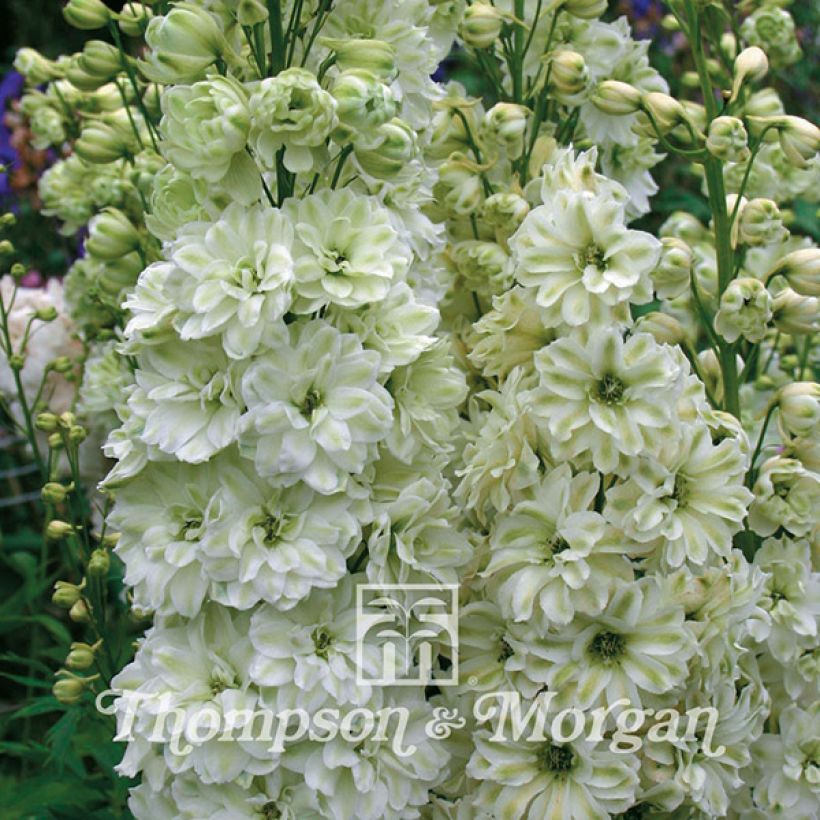

Flowering
Foliage
Plant habit
Safety measures
Botanical data
Delphinium
x elatum
Green Twist
Ranunculaceae
Candle Larkspur, Tall Larkspur, Perennial Larkspur
Cultivar or hybrid
ingestion
Cette plante est toxique si elle est ingérée volontairement ou involontairement.
Ne la plantez pas là où de jeunes enfants peuvent évoluer, et lavez-vous les mains après l'avoir manipulée.
Pensez à conserver l'étiquette de la plante, à la photographier ou à noter son nom, afin de faciliter le travail des professionnels de santé.
Davantage d'informations sur https://plantes-risque.info
Other Delphinium seeds
Planting and care
Sowing period
Intended location
This item has not been reviewed yet - be the first to leave a review about it.
Flower seeds
Haven't found what you were looking for?
Hardiness is the lowest winter temperature a plant can endure without suffering serious damage or even dying. However, hardiness is affected by location (a sheltered area, such as a patio), protection (winter cover) and soil type (hardiness is improved by well-drained soil).

Photo Sharing Terms & Conditions
In order to encourage gardeners to interact and share their experiences, Promesse de fleurs offers various media enabling content to be uploaded onto its Site - in particular via the ‘Photo sharing’ module.
The User agrees to refrain from:
- Posting any content that is illegal, prejudicial, insulting, racist, inciteful to hatred, revisionist, contrary to public decency, that infringes on privacy or on the privacy rights of third parties, in particular the publicity rights of persons and goods, intellectual property rights, or the right to privacy.
- Submitting content on behalf of a third party;
- Impersonate the identity of a third party and/or publish any personal information about a third party;
In general, the User undertakes to refrain from any unethical behaviour.
All Content (in particular text, comments, files, images, photos, videos, creative works, etc.), which may be subject to property or intellectual property rights, image or other private rights, shall remain the property of the User, subject to the limited rights granted by the terms of the licence granted by Promesse de fleurs as stated below. Users are at liberty to publish or not to publish such Content on the Site, notably via the ‘Photo Sharing’ facility, and accept that this Content shall be made public and freely accessible, notably on the Internet.
Users further acknowledge, undertake to have ,and guarantee that they hold all necessary rights and permissions to publish such material on the Site, in particular with regard to the legislation in force pertaining to any privacy, property, intellectual property, image, or contractual rights, or rights of any other nature. By publishing such Content on the Site, Users acknowledge accepting full liability as publishers of the Content within the meaning of the law, and grant Promesse de fleurs, free of charge, an inclusive, worldwide licence for the said Content for the entire duration of its publication, including all reproduction, representation, up/downloading, displaying, performing, transmission, and storage rights.
Users also grant permission for their name to be linked to the Content and accept that this link may not always be made available.
By engaging in posting material, Users consent to their Content becoming automatically accessible on the Internet, in particular on other sites and/or blogs and/or web pages of the Promesse de fleurs site, including in particular social pages and the Promesse de fleurs catalogue.
Users may secure the removal of entrusted content free of charge by issuing a simple request via our contact form.
The flowering period indicated on our website applies to countries and regions located in USDA zone 8 (France, the United Kingdom, Ireland, the Netherlands, etc.)
It will vary according to where you live:
- In zones 9 to 10 (Italy, Spain, Greece, etc.), flowering will occur about 2 to 4 weeks earlier.
- In zones 6 to 7 (Germany, Poland, Slovenia, and lower mountainous regions), flowering will be delayed by 2 to 3 weeks.
- In zone 5 (Central Europe, Scandinavia), blooming will be delayed by 3 to 5 weeks.
In temperate climates, pruning of spring-flowering shrubs (forsythia, spireas, etc.) should be done just after flowering.
Pruning of summer-flowering shrubs (Indian Lilac, Perovskia, etc.) can be done in winter or spring.
In cold regions as well as with frost-sensitive plants, avoid pruning too early when severe frosts may still occur.
The planting period indicated on our website applies to countries and regions located in USDA zone 8 (France, United Kingdom, Ireland, Netherlands).
It will vary according to where you live:
- In Mediterranean zones (Marseille, Madrid, Milan, etc.), autumn and winter are the best planting periods.
- In continental zones (Strasbourg, Munich, Vienna, etc.), delay planting by 2 to 3 weeks in spring and bring it forward by 2 to 4 weeks in autumn.
- In mountainous regions (the Alps, Pyrenees, Carpathians, etc.), it is best to plant in late spring (May-June) or late summer (August-September).
The harvesting period indicated on our website applies to countries and regions in USDA zone 8 (France, England, Ireland, the Netherlands).
In colder areas (Scandinavia, Poland, Austria...) fruit and vegetable harvests are likely to be delayed by 3-4 weeks.
In warmer areas (Italy, Spain, Greece, etc.), harvesting will probably take place earlier, depending on weather conditions.
The sowing periods indicated on our website apply to countries and regions within USDA Zone 8 (France, UK, Ireland, Netherlands).
In colder areas (Scandinavia, Poland, Austria...), delay any outdoor sowing by 3-4 weeks, or sow under glass.
In warmer climes (Italy, Spain, Greece, etc.), bring outdoor sowing forward by a few weeks.

































